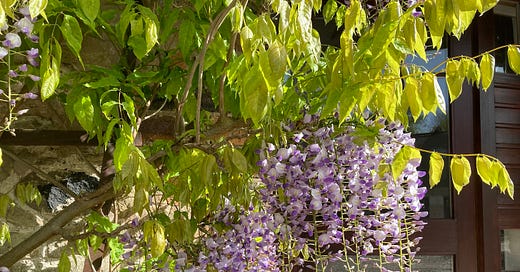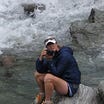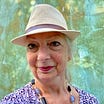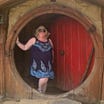A New Conversation
Threading Waters: Curated by Julia Adzuki with the Lay it on the Line collective
Dear subscribers,
Seven of us, based in Australia, Sweden, the UK, and the US, have started a conversation around art, ecology, philosophy and place. Welcome to Lay it on the Line: where curiosity meets candour.
Each month, one of us acts as curator, setting a theme with a short open letter, and the rest respond, bringing our own perspectives, questions, and preoccupations to the mix. For sure, we all love to write, and one of the reasons we’re doing this is to feel a little more connected, not just to each other, but to you.
So if something in the conversation below sparks a thought, a memory, writing of your own, drop it in the comments, or send a reply. We’d love to hear what comes up for you.
Our first conversation was curated by artist and forest dweller who also shaped the order of our responses so what follows is intentionally arranged, not alphabetical. The rhythm and interplay between pieces is part of the conversation itself.
Follow the thread all the way through, and please do explore and subscribe to the other writers joining me in this meaningful adventure.
If you're subscribed to my Substack, Before We Leave, you’ll receive every conversation automatically, one each month.
Bee.
ps I’ll be back later this week and every week this month of June with historic stories from the village where I live, and the third chapter of my book Before We Leave. Thanks for waiting.
Threading Waters
Dear Spring, not far from Carrick-on-Shannon in county Leitrim, Ireland,
I dropped the torch, as you and I both know. Stumbling in the dark of your cave, astonished by glow worms and the magic of you trickling out from between rocks, it flew from my hands. The man in the big house across the road told me where to find you, under a hillock in the middle of a field kept by sheep. He gave me a map of Shela-na-Gigs too, in response to my questions about mythologies of source. Water and life. I was weaving a story, making art works that played with place, trying to catch a whiff of magic. Perhaps that was my ultimate hubris, to try and catch you, to take from you without asking. The torch hit a rock and flew in parts, I groped around blindly looking for pieces. The lens, plastic casing and spring I found, but one of the batteries was missing. Somewhere in a nook between where my hands couldn't reach, you seemed to have swallowed it whole.
I am sorry. I think of you often but not without a sting of shame. Eleven years on, in your damp hollow, I guess that AA battery is corroding, leaching zinc from China, Peru or Australia and manganese dioxide, which I read was used by neanderthals to make cave paintings. Please forgive me for my mistaken cave painting. Though this is far from the worst I have done; criss-crossing the sky with carbon footprints, making mountains of modern fossils with single-use plastics and flushing. Flushing my shit away with well over one million liters of fresh drinking water, just one small and privileged person. Earth remembers us. But somehow, my reverence for you makes that one little battery all the more pointed. Thank you, for the shame I used to push away but am now turning to embrace, letting it's warm shower wash over me, reminding me that I love you.
x Julia
Dear Stanislaus River, at Kennedy Meadows Pack Station, California,
23 million years ago, you began flowing from an ancient mountain range in the Sierra Nevada. Sometimes swift, sometimes quiet, you babble your way between boulders, salmon and steelhead darting through your sun-dappled stretches. Native Americans called you home, and the oldest-known constructed dwelling in North America overlooks your waters. Spaniards claimed you, gold miners from the east crept over the Sonora Pass to comb through your waters. This is a small bit of your story, snapshots of the long history that flows in your current.
13 years ago, you became home to my mother’s final remains. Drawn to the music of your voice, she and Dad loved coming to Kennedy Meadows resort. This enclave, part horse camp, part refuge in the woods, overlooks your majesty. Years before she died, Mom placed Dad’s ashes beside you. I don’t know what words Mom said as she scattered his ashes next to your sacred waters. A sugar pine sprouted from the molecules of Dad’s earthly shell, shading the forest floor near your banks.
I read Mary Oliver’s poem, “Wild Geese,” and played a recording of Vaughn Williams’ “The Lark Ascending” as I scattered Mom’s ashes in a circle near Dad’s tree. Drops of water—two atoms of hydrogen, one of oxygen—blessed the ceremony. You, dear river, beat time with your own molecules, flowing over rocks.
Nature, never still, allows free passage through portals unseen, to places unknown. Rocked to sleep by your songs, Stanislaus River, you are home to all who love you, past and present. Saints and sinners, painters and plunderers, energies knitted together through time and space.
I was a Girl Scout during my youth, and my mother was a troop leader. This old scout song, “Peace, I ask of thee, Oh River,” feels like an appropriate way of honoring her, dad, and the river they loved.
Dear Julia,
Alfie would come indoors, shake himself free of rain at perhaps four Hertz a second, for three seconds.
Anyway, a million droplets cast into the kitchen, settling on furniture, floor.
I never recorded his shake. And that Hertz frequency would’ve been too low for human ears to hear as a tone, but the bioacoustics created a signature unique to Alfie. Each shake a percussive event, water droplets striking surfaces at different distances. Alfie’s magnificent fur created miniature sonic booms as it whipped through air. All combined into a complex sound, though I could only hear his shake. Which I still hear, though Alfie isn’t here. His efficient way to shed moisture was an acoustic rearrangement of our shared space. A momentary composition neither of us recognised as music but which formed part of our cottage’s sonic identity.
Afterward, after he’d laid down, got up, wandered off, Alfie’s damp outline lingered on the stone floor: an ancient cave painting, I thought. His was an ephemeral signature that disappeared within hours. I think of your spring in Leitrim, Julia, how it swallowed your battery into darkness. We all leave our marks. Some visible, some hidden beneath surfaces we cannot reach.
This cottage holds salvaged stories. A hardwood kitchen counter rescued from a tumbledown barn, in turn from a village pub where hands rested in 1918. Martha Moore’s chest, her name painted onto the wood in 1832. Oak shelves that survived the 2009 floods, from an art gallery in town that didn’t. We swapped gardening work for an AGA. Hazel stems from the hedgerow stop spice jars falling off old stepladders. Our son’s tile gleams with pressed beads catching light.
We live with environmental contradictions, fossil fuel heating while sustainable building regulations evolve, plastic windows paid in instalments, traditional lime mortar that lets stone walls breathe naturally. Like you, I feel that pointed sting when green intentions meet practical limits of living. Your battery and Alfie remind me how our losses become part of earth’s memory.
Perhaps reverence lives here, in acknowledging what we’ve altered while loving what alters us.
Sending love and wishing you peace of mind,
Bee.
To Mother Nature’s children
I can still smell it. The briny water so potent it seemed to summon a seagull’s caw. Or maybe that cry came from me. As I stared at the dead sea snail and winkles at the bottom of my red plastic bucket. The seaweed I'd added for nourishment floated limply like an ill-fitting shroud over their tiny bodies.
We had gone to the rockpools, I don’t remember which beach. Marsden, perhaps or Roker. We’d visit both often. My mam grew up near the sea, so it was her safe place; an outing she knew would settle her sensitive six-year-old. A place I could escape.
I had decided to bring the place back with us, so I could visit every day. A bucket of calm right there on the garden wall. A portal back to the beach, away from the noise, sights, and overwhelming expectations of everyday life.
But it was not to be. I grieved for the poor creatures I’d killed as I poured the slimy water onto the garden bed and buried them in their seaweed shroud, near the strawberry patch. I buried the shells I’d gathered too. Perhaps to hide my shame, maybe because I’d just learned about ancient Egypt, and wanted them to have a happy afterlife. I kept one thing. A hag stone. A stone with a hole, said to give you protection. I didn’t know that then, but I felt it. Holding it in my childish hands, then hiding it in my jewellery box.
Every day after school, the ballerina would jerkily spin to the mournful Greensleeves as I held the stone and offered my apologies to Mother Nature, and in exchange she gave me forgiveness and calm.
I no longer have the jewellery box, or the stone. Somehow lost in the shuffle of life. But I still offer my apologies when I am at the beach, by picking up ten bits of plastic and leaving everything else.
I often find a hag stone, but now I just take a picture. A reminder that protection and peace are always out there, just waiting to be found on the shore. Washing up on the waves, carrying Mother Nature’s forgiveness.
Donna
Dear Three Sisters Springs, Florida
Clear, turquoise waters lap at my kayak. The red dive flag flaps behind me in the gentle breeze, the sea grass soft and lush. A sudden shock of bright pink peeks from the swaying grass. I paddle closer to poke it with my oar. A child’s snorkel floats free. I maneuver the slime coated detritus up out of the spring, feeling ridiculously triumphant. Moons ago, I lost a pink snorkel into a crag of lava rocks where it landed between sea urchins in Kona, Hawaii. I was unable to retrieve it. Finding this snorkel and removing it from a spring in Florida feels like repayment. And yet, this small action doesn’t begin to erase my eco debts, things like driving a car all over hell and half of Georgia for work.
Mother Earth seems pleased with me regardless. Perhaps the mermaids are watching the human who cares enough to clean up after her people. My paddle laid across my lap, the lazy fish making gentle waves, the busy birds arguing in the trees, I bask for a time in a calm, relaxing drift until a tug on the dive flag startles me. I turn to find a bristly grey face peering up at me. A young manatee, already larger than my boat, grips the bottom of the kayak with her flippers so she can investigate the bright red triangle trailing the water.
A giggle bubbles up. I reach out a finger to touch the big, whitish belly peeking out from under the boat. I feel a sort of rumble through the baby manatee, but she doesn’t let go, so I give her a proper belly rub, a huge smile on my face. Soon, I’m surrounded by manatee mermaids who stop to say hello. They swim under me, some bringing brand new babies with them, the biggest cows double the size of my kayak, and every one gentle, barely jostling the boat. Many take a moment to lift their faces from the water and look up at me as I chatter away, hoping they understand human. Experiencing the ripples of care I offer come back to me ten-fold is the truest form of magic. Thank you, Springs.
xo Amanda
Hello dreamy wisteria!
Here you are: curling, curving, open-armed. Your delicate lantern flowers were cloaked inside seductive grey racemes when I left to go away for ten days. And now I return to see your two-tone lilac-ness dripping from twisting stems, framing the glazed front door that, from an angle, doubles your impact.
Wisteria floribunda: resolute, gentle, determined to weave your way up gradually, clockwise, as though you keep time for me, turning, turning, like the hands of a dial. You grow from between the stones of the courtyard where you were planted some eleven years ago. Each season you’ve thrown pieces of yourself out into the morning, searching for a crevice, a clinging point, a tiny gap into which you could lay down and rest for a moment before taking hold—in a gutter, a window frame, a ledge. You’ve succeeded in finding crannies for your tendrils. But only when I let you. Only when I held back my pruning shears. And when I thwarted you, I was forgiven in an instant. You sought other routes, sideways. Your lithe silver-grey stems twist loosely, sometimes tightly, as you wend across the wall over stones warmed by the sun. And together we have constructed an arch over the doorway, a framework for your handsomeness.
Here I am: standing before you in early May with my suitcase paused and my front door key ready, but I stay a while to let your satisfying sweet scent flow over me before I cross the threshold. A light breeze picks you up and swirls your fresh fragrance into the house as I enter, and I take a breath.
Dear Julia, when you return,
Eleven years have passed. Each year I revise this letter. The man in the big house is gone now, he took the many secrets of human impulses and frailty with him. Did you notice his bee boxes out back. Why is it that covens keep a man who tends to bees is a story for another time, but I believe it is part of the magic of place. Bees, a bellwether for land health. Water is a historical harbinger in all its forms.
Our assembly of thirteen watched you from the window. Mother carried the book—the one with songs, potions and spells. The gardener went about his work, and you walked in the funnel between hedge rows of blackthorns and field maple. You tempered your steps near the shaded entry. An insignificant cathedral unless being searched for.
You are one of the chosen ones. For a time, you drifted towards sacred places. Mysteries like water. Your enlightenment is far greater than any torch you carried or any pieces you left behind. No doubt you have carried the weighty burden of this memory. To be human is a complexity. To know the wild is to be open-eyed to each source of impact. Each human one source.
I tell you now, because in the faults of human time, nature has a cure. It is a remarkable one, to be sure. Her patterns of rhythm and intention senses the mistakes and is preparing to reconvene the eight sources of water. She will flush and cleanse the surface. She will remodel the hillock you threaded. But you already knew this. From your hastened departure from the cold yawn of a now different cave entry, we watched from the window and knew you would not remember how, how you held the bottom of your skirt and wiped the strands of hair from your face. We knew one day you would understand the lighted glow worm tintinnabulations. Nature, she will tidy what is left.
In Spirit,
Stacy
Dear Reader,
This is the first in our series of Lay it on the Line collaborations, with the seven of us writing from the UK, the United States, Australia and Sweden. In our breadth of styles there is a common thread of sensorial experience, ecology, art, philosophy and place.
We will be publishing once a month, with a rotating curatorship – the one who writes the opening piece to which everyone responds. Thanks to Bee LilyJones for reaching out and inviting us all on this adventure.
We welcome you to continue Threading Waters with us in the comments:
Is there a water/place stirring in you or that you feel somehow indebted to?
Or perhaps an undercurrent of environmental contradiction that needs air?













Thanks for bringing us together Bee! There is a sense of adventure in what we are embarking upon, no idea where it will take us but far beyond the realms that any of us might travel to alone.
I just woke up to find my notifications miraculously have healed themselves. AND this is posted on two more pages. I love how the fun will keep going over the next week or so of this post going live on everyone’s page.